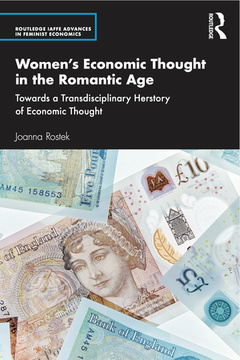Women’s Economic Thought in the Romantic Age Towards a Transdisciplinary Herstory of Economic Thought Routledge IAFFE Advances in Feminist Economics Series
Auteur : Rostek Joanna

This book examines the writings of seven English women economists from the period 1735?1811. It reveals that contrary to what standard accounts of the history of economic thought suggest, eighteenth- and early nineteenth-century women intellectuals were undertaking incisive and gender-sensitive analyses of the economy.
Women?s Economic Thought in the Romantic Age argues that established notions of what constitutes economic enquiry, topics, and genres of writing have for centuries marginalised the perspectives and experiences of women and obscured the knowledge they recorded in novels, memoirs, or pamphlets. This has led to an underrepresentation of women in the canon of economic theory. Using insights from literary studies, cultural studies, gender studies, and feminist economics, the book develops a transdisciplinary methodology that redresses this imbalance and problematises the distinction between literary and economic texts. In its in-depth readings of selected writings by Sarah Chapone, Mary Wollstonecraft, Mary Hays, Mary Robinson, Priscilla Wakefield, Mary Ann Radcliffe, and Jane Austen, this book uncovers the originality and topicality of their insights on the economics of marriage, women and paid work, and moral economics.
Combining historical analysis with conceptual revision, Women?s Economic Thought in the Romantic Age retrieves women?s overlooked intellectual contributions and radically breaks down the barriers between literature and economics. It will be of interest to researchers and students from across the humanities and social sciences, in particular the history of economic thought, English literary and cultural studies, gender studies, economics, eighteenth-century and Romantic studies, social history, and the history of ideas.
1. Introduction Part I: A Transdisciplinary Methodology for a Herstory of Economic Thought 2. Women and Scholarship, or: The Cultural Forms of Knowledge Formation 3. Women and Economics, or: The Outside(r)s of Economic Discourse 4. Women and Writing, or: The Gendered Legacy of Genre Interlude: Gender, Genres, and Knowledge Formation Today Part II: Women’s Economic Thought in the Romantic Age 5. Feminist Economics of Marriage 6. Women and Paid Work 7. Moral Economics 8. Conclusion: The Patriarchal Economy Works Cited
Joanna Rostek is Junior Professor of Anglophone Literary, Cultural, and Media Studies at the University of Giessen, Germany. She was a visiting scholar at institutions in Scotland, Poland, and the US and is co-founder of the research network Methodologies of Economic Criticism. She has published extensively on women’s writing and on the relationship between literature, culture, and the economy.
Date de parution : 01-2021
15.6x23.4 cm
Date de parution : 01-2021
15.6x23.4 cm
Thèmes de Women’s Economic Thought in the Romantic Age :
Mots-clés :
Women Economists; Patriarchal Economy; Sarah Chapone; history of economic thought; Romantic Age; eighteenth-century women intellectuals; Wollstonecraft; economic enquiry; Mary Wollstonecraft; gender studies; Androcentric Bias; literary studies; Transdisciplinary Methodology; literary and economic texts; Exclusionary Economy; economics of marriage; Wollstonecraft’s Wrongs; women and paid work; Violate; moral economics; Egalitarian Economics; literature and economics; Persona; economic thought; Economic Texts; Romantic studies; Matrimony; gender-sensitive approach; Female Advocate; English women economists; Fanny Dashwood; Romantic women's writing; John Dashwood; women's paid work; Married Women; transdisciplinary herstory; Young Man; Nomen Est Omen; Lady’s Monthly Museum; Female Dancing Teachers; Heteronormative Family Unit



